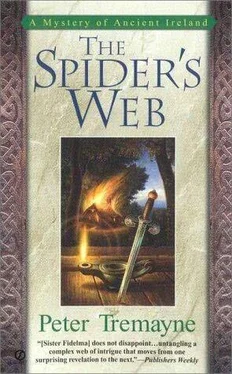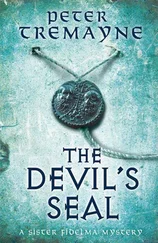Peter Tremayne - The Spider's Web
Здесь есть возможность читать онлайн «Peter Tremayne - The Spider's Web» весь текст электронной книги совершенно бесплатно (целиком полную версию без сокращений). В некоторых случаях можно слушать аудио, скачать через торрент в формате fb2 и присутствует краткое содержание. Жанр: Исторический детектив, на английском языке. Описание произведения, (предисловие) а так же отзывы посетителей доступны на портале библиотеки ЛибКат.
- Название:The Spider's Web
- Автор:
- Жанр:
- Год:неизвестен
- ISBN:нет данных
- Рейтинг книги:5 / 5. Голосов: 1
-
Избранное:Добавить в избранное
- Отзывы:
-
Ваша оценка:
- 100
- 1
- 2
- 3
- 4
- 5
The Spider's Web: краткое содержание, описание и аннотация
Предлагаем к чтению аннотацию, описание, краткое содержание или предисловие (зависит от того, что написал сам автор книги «The Spider's Web»). Если вы не нашли необходимую информацию о книге — напишите в комментариях, мы постараемся отыскать её.
The Spider's Web — читать онлайн бесплатно полную книгу (весь текст) целиком
Ниже представлен текст книги, разбитый по страницам. Система сохранения места последней прочитанной страницы, позволяет с удобством читать онлайн бесплатно книгу «The Spider's Web», без необходимости каждый раз заново искать на чём Вы остановились. Поставьте закладку, и сможете в любой момент перейти на страницу, на которой закончили чтение.
Интервал:
Закладка:
Fidelma noticed that she wore a dress of blue silk and matching shawl of dyed wool fastened with an elaborate gold brooch. She held her hands folded demurely before her. The young woman stood examining them with a questioning expression.
‘I am Crón, tanist of the Araglin. I am told that you wish to see me?’
Her voice, though a mellow soprano, was not welcoming.
Fidelma hid her surprise that one so young could be chieftain-elect of a farming clan. Rural communities were usually conservative as to who they approved of as civil leaders over them.
‘I believe that my arrival is expected,’ she replied. She kept her tone formal.
The blonde-haired girl’s face remained blank.
‘Why should I be expecting members of the religious at this place?’ she countered. ‘Father Gormán fulfils all our needs in the matter of our Faith.’
Fidelma stifled a low impatient sigh.
‘I am a dálaigh of the courts, asked to come to this place to investigate the death of Eber, your former chieftain.’
Crón’s set expression flickered for a moment and then reformed into its expressionless rigidity.
‘Eber was my father,’ she said quietly, the only expression of emotion. ‘He was murdered. It was without my approval that mymother sent to the king in Cashel requesting a dálaigh. I am capable of conducting an inquiry into this matter myself. However, I hardly expected the king of Cashel to answer me by sending one so young and presumably without knowledge of the world outside a religious cloister.’
Brother Eadulf, standing just behind Fidelma, saw her shoulders stiffen and tensed himself waiting for the inevitable blast of wrath from Fidelma. Instead, her voice remained calm, almost too calm.
‘The king of Cashel, my brother Colgú …’ Fidelma paused to allow the emphasis of her words to sink in. ‘My brother asked me to come here to take personal charge of this matter. You may have no fear that I am without knowledge. I am trained to the level of anruth. I am tempted to believe that my years and experience will be in excess of your own, tanist of Araglin.’
The level of anruth was only one degree below the highest award that the secular and ecclesiastical colleges of Ireland could bestow.
There was a silence as both women stood regarding each other, cold blue eyes gazing deeply into sparkling green ones, each face a mask without emotion. Behind those masks, minds rapidly made assessments of the strengths and weaknesses of each other.
‘I see,’ Crón said slowly, putting a wealth of emotion in the pronouncement of the simple phrase. Then she returned to her sharp manner. ‘And what is your name, sister of Colgú?’
‘I am Fidelma.’
The cold gaze of the blonde woman now turned quizzically to Eadulf.
‘This brother appears to be a stranger in our land.’
‘This is Brother Eadulf …’ introduced Fidelma.
‘A Saxon?’ queried Crón in surprise.
‘Brother Eadulf is emissary of the archbishop of Canterbury at my brother’s court in Cashel. He has been trained at our colleges and knows our country well. But he has expressed an interest to see how our legal processes work.’
It was not the entire truth but it would do for Crón.
The chieftainess regarded Eadulf sourly, inclining her head in greeting, no more than for etiquette’s sake, before turning back to Fidelma. She made no attempt to invite them to sit neither did she attempt to do so herself.
‘Well, this matter is a simple one. I, as tanist, could have dealt with it. My father was stabbed to death. The killer, Móen, was discovered still standing over his body with the knife in his hand, Móen’s hands and clothes were covered in my father’s blood.’
‘I am told that someone else was also found dead at the same time?’
‘Yes. My aunt, Teafa. She was found later. She had been stabbed to death, too. Móen had dwelt in her house and had been raised by her.’
‘I see. Well, I shall wish to gather the basic facts. But, firstly, perhaps you would instruct someone to show us to your guests’ quarters where we may clean ourselves after our journey? Food would not go amiss as it is after midday. When we have washed and eaten then we can start to question those involved in this matter.’
A flush crossed Crón’s features at thus being instructed in her duties as host for such an action could be regarded as an insult had it been uttered by anyone of lesser rank than Fidelma. There was a steely glint in the cold blue eyes. For a moment Eadulf was sure that the young tanist was going to refuse. Then she shrugged and turned to a side table on which stood a small silver handbell. She picked it up and tinkled it loudly.
A moment or so passed in uncomfortable silence before an elderly woman, slightly stooped with greying hair, though it had once been fair, appeared through a side door. Her features were gaunt, the skin yellowing where once it had been tanned by a life spent mainly outdoors. The eyes were pale and suspicious. They darted here and there like the eyes of a nervous cat. In spite of her age, she gave the impression of strength, a woman used to theharsh life of farming. Her broad hands bore the callouses of years of toil. She moved with an anxious gait to Crón and bobbed her head.
‘Dignait, please see to the needs of our … guests. Sister Fidelma is here to investigate the murder of my father. They will require accommodation, water to wash and food.’
The woman, Dignait, glanced towards Fidelma and Eadulf. Fidelma had the momentary impression that her eyes were startled and fearful. Then it was as if the lids hooded them.
‘If you will both accompany me …?’ Dignait invited them almost woodenly.
Crón turned away with a suspicion of a sniff.
‘When you are ready,’ she called over her shoulder as she began to walk back towards the curtain behind her chair of office, ‘I will explain to you the details of what took place.’
Dignait conducted them through a small side door out of the hall and across an open yard to the guests’ hostel. It was a simple, single storey wooden building at the back of the hall of assembly, consisting of a single large room, partitioned into several sleeping cubicles by simple screens of polished deal. Behind each screen was a pallet of straw. A carved log of polished wood served as a pillow, a linen sheet and woollen rugs provided the bed coverings. Dignait ensured that they approved of the comfort of their beds. An open section of the building stretched before the cubicles, containing several benches with a table where guests could eat and which generally was used as living quarters. There was a hearth but no fire had been lit. When Dignait remarked on this fact, Fidelma said the weather was too clement for the need of a fire.
The wash room and privy were found beyond a second door at the far end of the guests’ house. The door was marked with a small iron cross. Fidelma presumed that this was a sign of the work of Father Gormán for the privy was called a fialtech, or veil house, by certain religious who had picked up the concept from Rome. They believed the Devil dwelt within the privy and itbecame the custom to make the sign of the cross before entering it.
When Fidelma pointed out the needs of their horses, Dignait assured her that she would asked Menma, who was in charge of the stables, to wash and feed them.
Fidelma then expressed satisfaction with the accommodation but called Dignait to stay a moment when she would depart. Dignait seemed to pause with obvious reluctance.
‘You must have been in service here for many years,’ Fidelma opened the conversation.
The old woman’s expression increased in suspicion. The eyes continued to be hooded but she did not refuse to answer.
Читать дальшеИнтервал:
Закладка:
Похожие книги на «The Spider's Web»
Представляем Вашему вниманию похожие книги на «The Spider's Web» списком для выбора. Мы отобрали схожую по названию и смыслу литературу в надежде предоставить читателям больше вариантов отыскать новые, интересные, ещё непрочитанные произведения.
Обсуждение, отзывы о книге «The Spider's Web» и просто собственные мнения читателей. Оставьте ваши комментарии, напишите, что Вы думаете о произведении, его смысле или главных героях. Укажите что конкретно понравилось, а что нет, и почему Вы так считаете.











